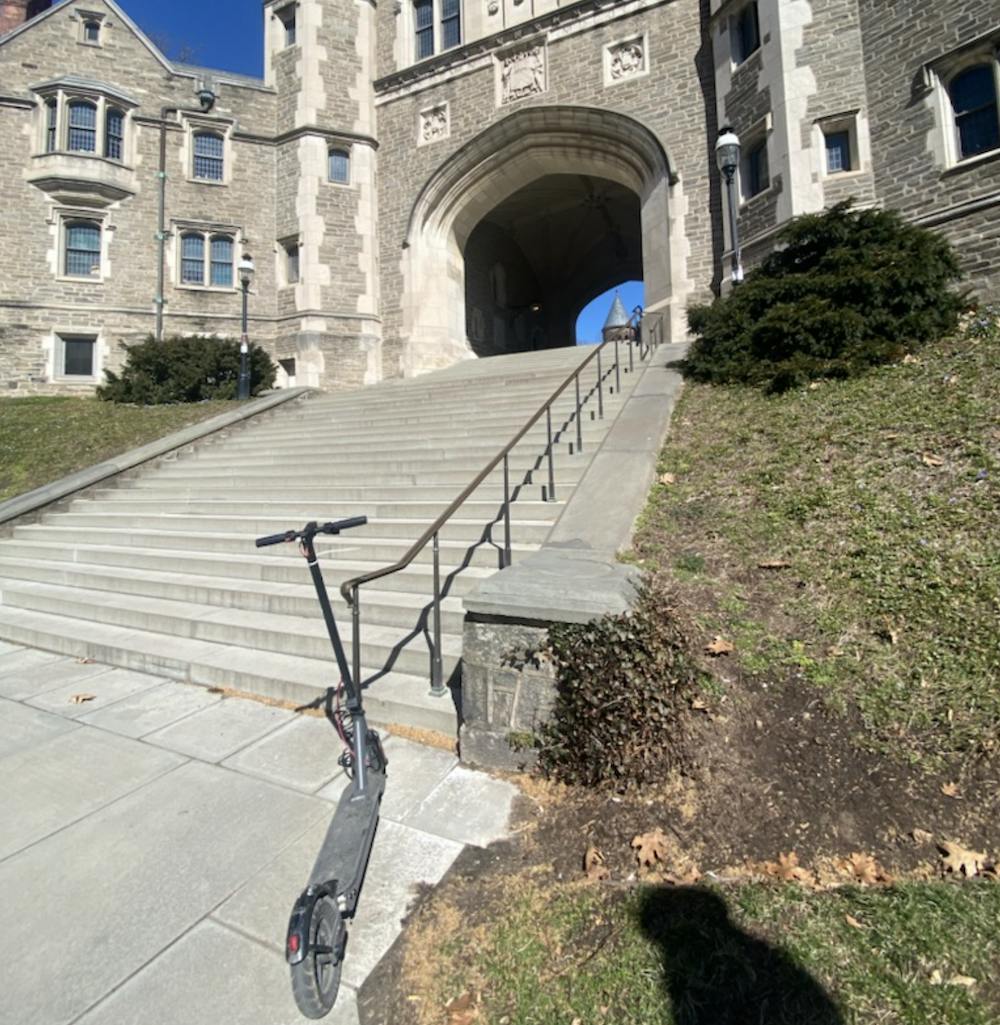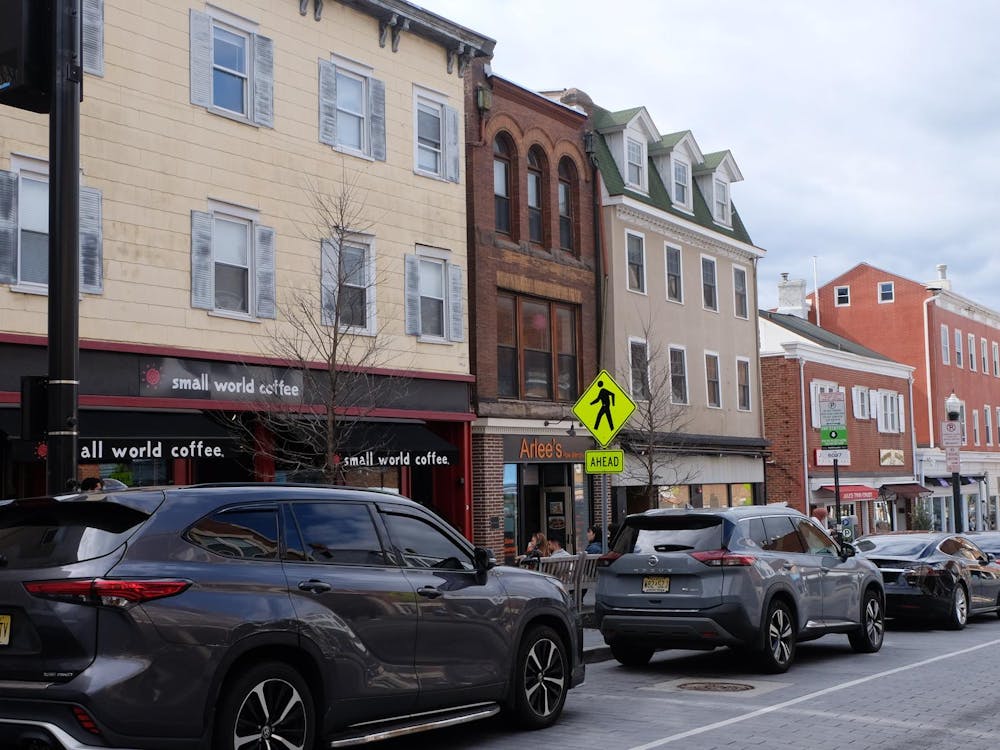A campus message issued on Monday, Dec. 4 officially banned Personal Electric Vehicles (PEVs) starting Jan. 25, 2024. More specifically, the ban prohibits use — and “storage, parking, and charging” — of any PEV in the “restricted zone,” which encompasses basically all of campus, according to the message. This is an escalation of an August policy that placed restrictions on hours and speeds within the zone.
The email detailed that this policy change comes on the heels of evaluations of the results of the August restriction. A “third-party consultant” found “nearly the same levels of e-scooter use during restricted hours in October 2023 as those seen in February 2023.” Additionally, the email specifically cited violations of PEV policies, including “exceeding the 10 mph speed limit, failing to yield to pedestrians, operating with two passengers on a single device, and riding while using headphones or other audio devices.”
The University has stressed safety concerns about scooters. In an email to Princeton Alumni Weekly (PAW) earlier this year, Charles Tennyson, director of Transportation and Parking Services, wrote that the number of on-campus PEV incidents, which are often collisions or injuries, increased from 32 to 54 between the 2021-2022 academic year and the 2022-2023 academic year. Many paths on campus are currently blocked due to construction detours.
The August ban excluded “electric wheelchairs, mobility scooters, or other electric mobility devices specifically designed for and used by an individual with a mobility-related disability” — an exclusion that also exists in the current form of the restrictions.
Among scooter users, students found a variety of benefits for the electric devices. Concerns about getting from class to class on time has prompted discussions of lengthening passing time beyond the current 10 minutes.
Chris-Tina Middlebrooks ’27, who purchased a scooter before the Aug. 25 policy was released, emphasized the importance of a scooter for her academic schedule.
“I started looking around and seeing that there were still scooters on campus, which made me inclined to start using my scooter more,” she said, “I do not use it every day, but on days where I might be late to class, or I might need to run and get extra help for office hours, I would use my scooter. So I feel like it’s definitely something that’s beneficial to a lot of people.”
Grace Zhao ’26 said that having a scooter also allowed her to more easily participate in activities outside of academics. Zhao, who first bought a scooter in the spring of 2023, said, “I definitely notice myself going to more social events. I think that was the key point.”

Zhao is a contributing Data writer for the ‘Prince.’
Some students felt that due to a lack of clear enforcement efforts from the administration earlier in the semester around PEV restrictions, there were higher numbers of violations of the policy.
Matthew Okechukwu ’27, for instance, expressed that “In [his] opinion, a ban is a bit too harsh … I feel like with the previous ban, there wasn’t too much enforcement, thus leading to this ban.”
In addition to instating a ban on the usage of PEVs, the email also details consequences that students could face for vehicles that are “stored, parked, or charged” within the zone, which encompasses all undergraduate residential and academic spaces, as well as athletic facilities: students are expected to remove their electric vehicles by Jan. 25 or face impoundment. Okechukwu explained that last week his scooter “stopped working, so [he] had to issue a replacement, which was coming quite soon, and then [he heard] about this scooter ban.”

To aid students in taking their scooters from campus, the University is offering a free shipping service. The email encouraged students to “ideally [remove] them as you depart for winter break.”
Students with scooters differed on their plans for transportation after the ban. Zhao said that without a scooter, she used to “schedule everything around the bus schedule, which to me was very annoying. She added that the buses sometimes come late, “so if you want to give yourself ample time to make sure you’re not late to your classes, you have to waste some time in that respect as well.”
Other students, like Middlebrooks, are considering continuing to use their own vehicles or purchase them — and what kinds of vehicles remain allowable has caused some confusion.
“Next [semester], I have three classes that are back to back within 10 minutes, and they’re miles apart from each other,” she said. “It’s very troublesome for me to be taking that walk every single day without having my PEV to get to and from my destinations.”
Middlebrooks has considered using an Electric Bicycle (e-bike), which she said so she doesn’t “make a bad impression on [her] professors” for being tardy.
“E-bikes cannot be banned because the motor is attached to a regular bike. That’s something that I've been seeing a lot of people utilize, where they are not being restricted or reprimanded because they can ride their bike, but most of the time, they’re using that motor to help them get around,” she said.
The email did, however, explicitly discuss the use of e-bikes, stating that “Electric bicycles in ‘electric-assist’ mode are permitted on campus roadways, but not sidewalks or pedestrian pathways,” though the bikes “may be operated as traditional bicycles on pedestrian pathways.”
The ban will likely continue at least until the completion of long-term campus construction projects. The email stated that it is “expected that these restrictions will remain in place while the University executes on longer-term projects to create safe, multi-modal east-west and north-south corridors across campus.”
Outside of the University, the town is also working to crack down on scooters, currently under a longstanding ordinance that considers scooters as “skateboards,” which are currently banned on certain town sidewalks.
A proposed amendment to the municipality of Princeton’s previous vehicle ban would clarify that scooters are included in the ban. The next public meeting of the town council will be held on Dec. 11.
Christopher Bao is a News contributor for the ‘Prince.’
Ethan Caldwell is a News contributor for the ‘Prince.’
Please send any corrections to corrections[at]dailyprincetonian.com








